A homophone or 谐音 (xié yīn) in Chinese is two or more words that have the same pronunciation but different meanings, origin, or spelling. There are plenty of homophones in the English language, but since Chinese uses tones to indicate the meaning of the spoken word, there are even more ways to create both spoken and written puns and homophones. Of course, many of these homophones, especially the more humorous ones and those involving numbers and been created by modern-day netizens who appreciate slang and being slightly risque with their use of language.
Chinese Homophones to Use Online
The following words are used purely for fun whilst chatting online. You can just replace the normal meaning with the second to make the subject matter more lighthearted and amusing.
1. bēi jù 悲剧 tragedy and 杯具 glass
Many netizens replace the word 悲剧 tragedy with 杯具 glass to discuss negative feelings towards things, people etc.
For example: 人生是张茶几,上面放满了杯具。 (rén shēng shì zhāng chá jī, shàng mian fàng mǎn le bēi jù) Life is a coffee table, filled with cups (tragedy).

2. xǐ jù 喜剧 comedy and 洗具 washing tool
This is a continuation of the above homophone on ‘tragedy’. 洗具 washing tool began to replace ‘comedy’, sometimes combined with the above example:
这个世界到处都是杯具,而我是杯具中的洗具,洗具中的战斗机!(zhè ge shì jiè dào chù dōu shì bēi jù, ér wǒ shì bēi jù zhòng dì xǐ jù, xǐ jù zhòng dì zhàn dòu jī) This world is full of cups (tragedy), and I am the washing utensil (comedy) in the cup (tragedy), the fighter in the washing utensil (comedy)!
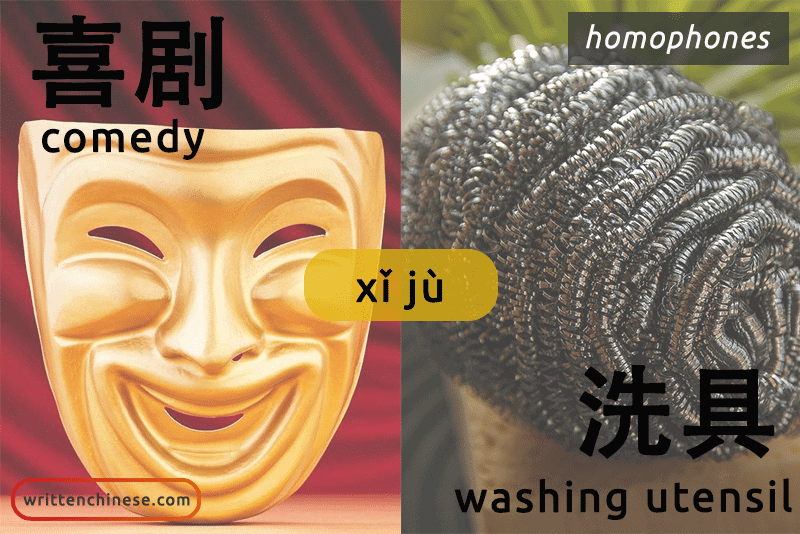
3. yā lì / yā lí 压力 pressure and 鸭梨 white pear
‘鸭梨大’ (yā lí dà) is often used to discuss a ‘big pressure’ online.
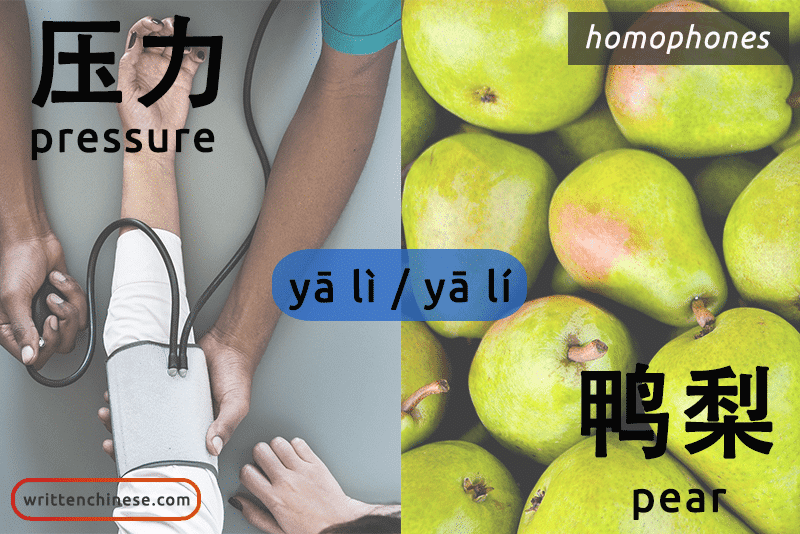
4. guò jiǎng / guǒ jiàng 过奖 to flatter and 果酱 jam
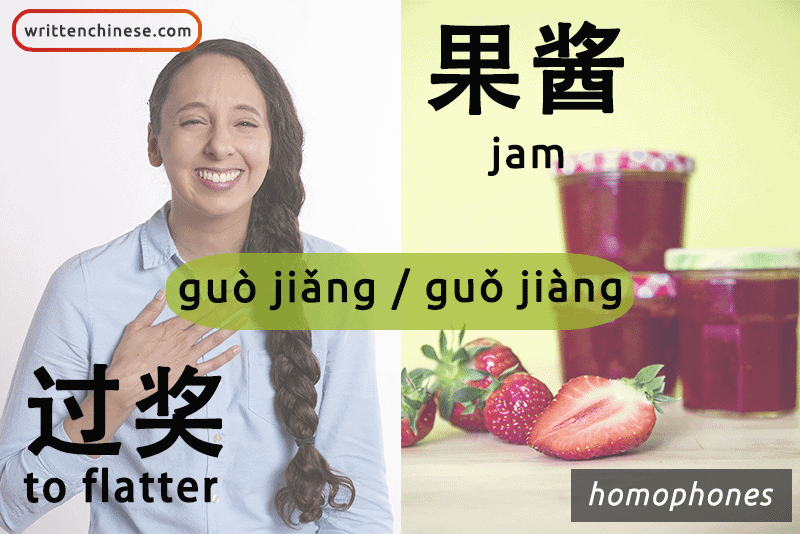
5. yè zhǔ / yě zhū 业主 owner and 野猪 wild boar
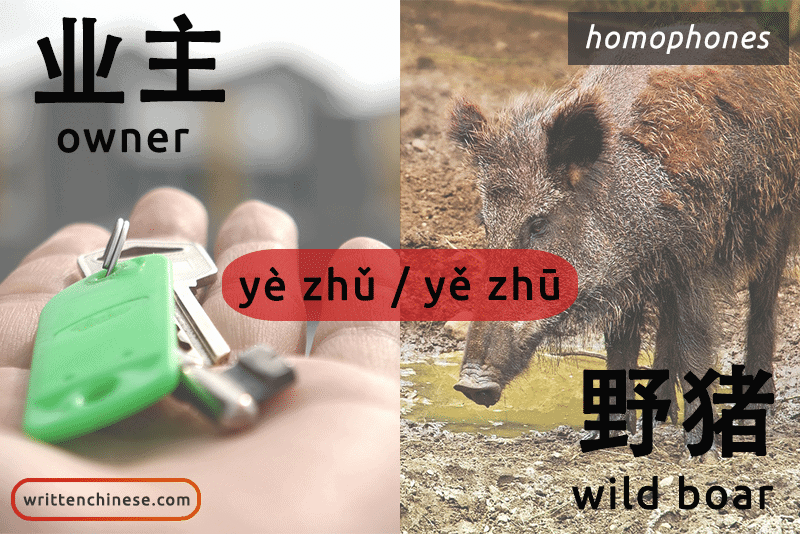
6. gōng jī 攻击 attack and 公鸡 rooster
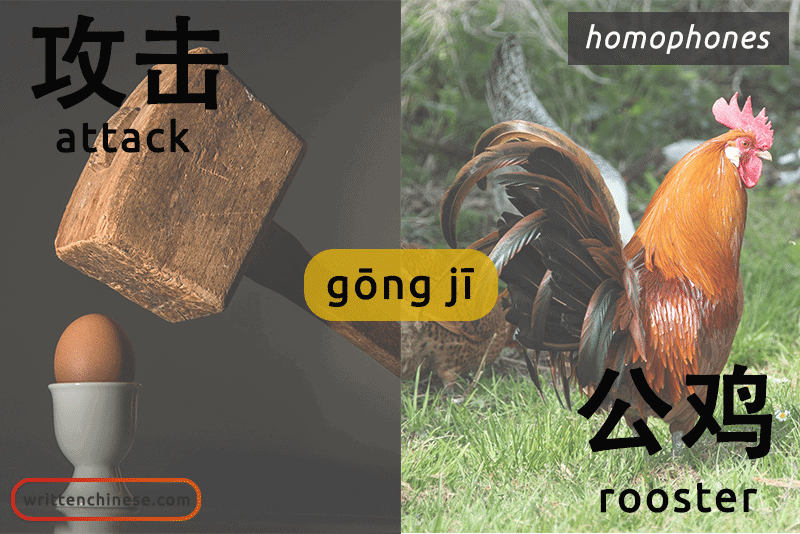
7. chá jù / chā jù 茶具 tea set and 差距 gap
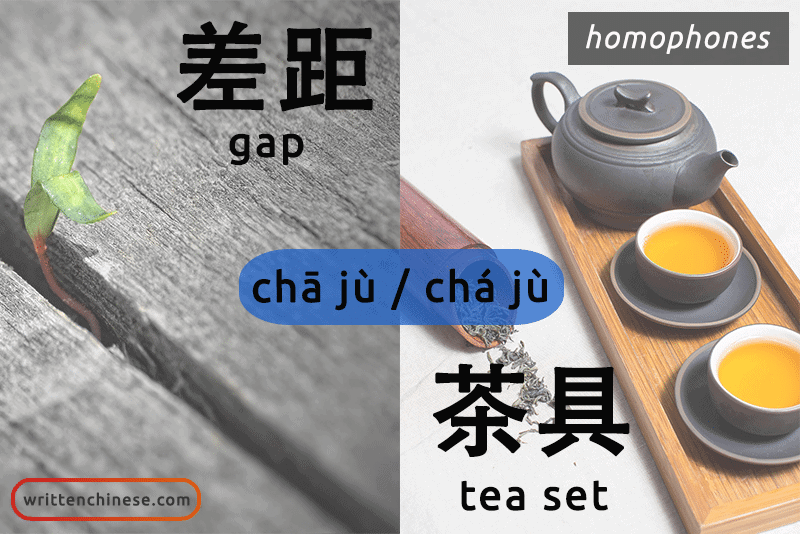
8. jì yì 记忆 to remember and 技艺 skill / art
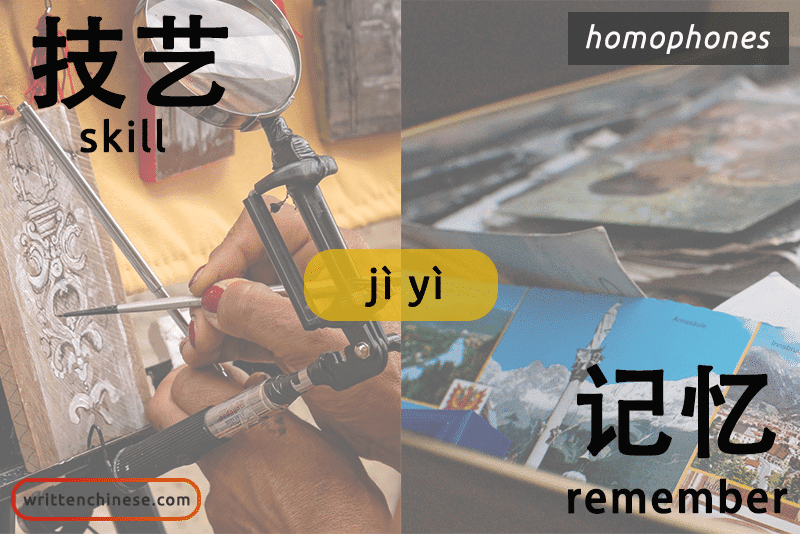
9. bān zhú / bǎn zhǔ 斑竹 mottled bamboo and 版主 forum moderator
斑竹 ‘bamboo’ is now commonly used online to refer to a moderator of a forum.
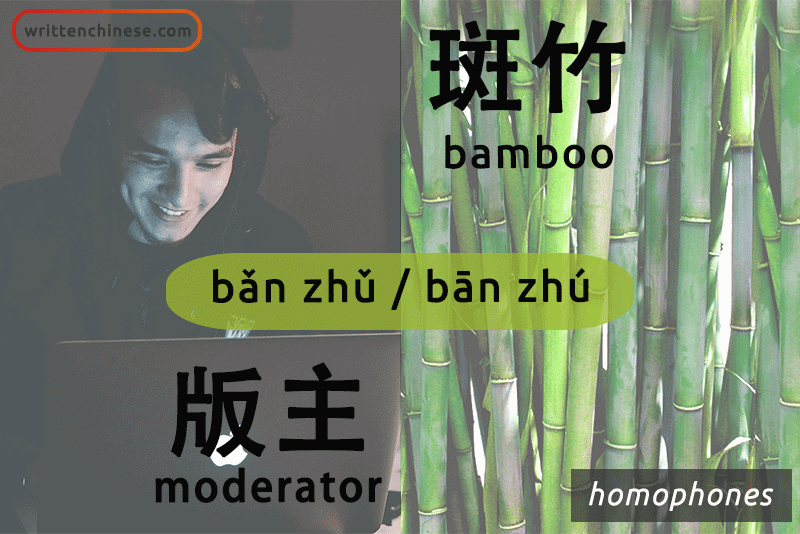
10. tóng xié / tóng xué 童鞋 children’s shoe and 同学 classmate
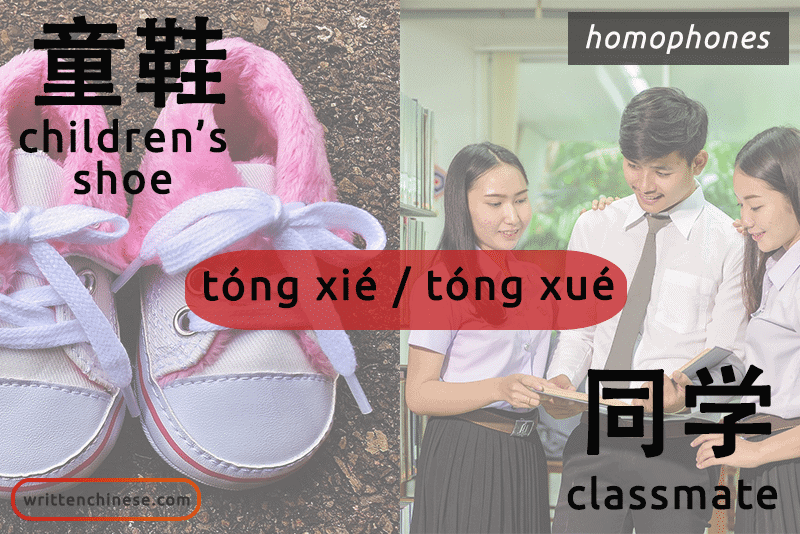
Traditional Chinese Homophones
There are traditional Chinese homophones that share the same pinyin but have different meanings. It’s highly unlikely that people conversing could become confused about which word is being referred to, apart from if you think that a girl is a duck head…
1. 由于 鱿鱼 (yóu yú) because / squid
2. 丫头 鸭头 (yā tóu) girl / duck head
3. 电源 店员 (diàn yuán) power supplier / clerks
4. 无限 无线 (wú xiàn) infinite / wireless
5. 去世 趣事 (qù shì) pass away (die) / funny thing, interesting story
6. 报复 抱负 (bào fù) revenge / ambition
7. 休养 修养 (xiū yǎng) recuperate / accomplishment, self-cultivation
Chinese Number Homophones
Some of the number homophones might seem a bit odd and you’ll probably think ‘that number doesn’t sound anything like [insert Chinese character here]’, but most of them are interesting and also useful if you chat online. Number homophones are used just like slang amongst Chinese netizens. Here’s a short list of some of the most common homophones, and trust me, there are a lot!
2 (èr) 爱 (ài) – 2 (èr) sounds a little bit like ài…and 爱 means love, so you can say 521 (wǔ èr yī) or 520 (wǔ èr líng) – I love you. 521 and 520 sounds like 我爱你 (wǒ ài nǐ).
9494 (jiǔ sì jiǔ sì) – 就是就是 (jiù shì jiù shì) 9494 is used to say something like ‘For sure!’ or ‘Definitely!
517 (wǔ yāo qī) – 我要吃 (wǒ yào chī) means ‘I want to eat’ which sound a bit like the numbers 517 (wǔ yāo qī). In spoken Chinese, the number one becomes ‘yāo’ which is the same pronunciation as 要 (yào).
531 (wǔ sān yī) – I really like this example. If you say 531 (wǔ sān yī), it sounds a lot like the Chinese for I miss you ‘我想你‘ (wǒ xiǎng nǐ). It really does, speak it out loud now!
55555 (wǔwǔwǔwǔwǔ) – crying 呜呜呜呜呜 (wū wū wū wū wū). Just say wǔwǔwǔwǔwǔ.
1314 (yī sān yī sì) – 1314 is used to say ‘all my life’ since the numbers 1314 (yī sān yī sì) sound like the popular idiom, 一生一世 (yī shēng yī shì).
8 – 不 – Simply, 8 (bā) can be used to say ‘no’ or 不 (bù).
8 or 88 or 886 – bye bye (looks like 白白). This is a long one. 88 not only looks like the characters 白白 (bái bái), but the pronunciation is similar to that of 拜拜 (bài bài) the lone word for ‘bye bye’
3Q (sānq) – 3 is Chinese is pronounced sān and has a similar pronunciation to thank…
54 (wǔ sì) – 无视 (wú shì) to ignore, just say 我54你!
4242 (sì èr sì èr) – 是啊是啊 (shì a shì a) 4242 is another way of saying yes.
Do you know any more Chinese homophones? Share them with us below!
